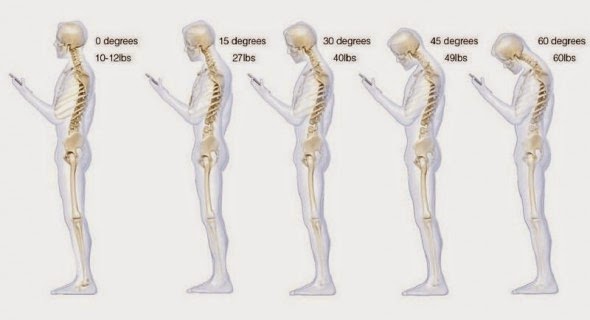Posture, exercise, and sleep play key roles in our health. Our always-connected life-styles, late night screens, and long driving commutes play key negative roles as well. Each contributes in their own way and our 300,000 years of evolution don’t change overnight.
Let’s start today by examining the role of posture for our hormonal balances.
This blog includes affiliate links.
Please see my Disclaimers page for more information.
Vivian Giang of Fast Company provides a quick overview of the concept of embodied cognition. Embodied cognition means our body and our mind have a hormonal two-way street in which each affects the other. Amy Cuddy popularized power poses as a specific example of embodied cognition in her 2012 Ted Talk in which she argued that taking a confident posture will generate actual confidence. While she cites her own research in the Ted Talk, many other scientists have research that supports the claim.
Richard Petty, professor of Psychology at Ohio State University conducted a 2009 study in which sitting up straight was compared with sitting slouched forward with faces looking at knees. Those sitting upright had positive self-judgement and those slouched forward didn’t “trust anything they wrote down” in their self evaluations.
Erick Peper, professor of Psychology at San Francisco State University, conducted a series of similar studies with similar results in 2012. He concluded it only takes two minutes of posture positioning to affect brain chemistry and even simple activities, such as skipping versus walking, have a striking impact on mood, energy levels, etc.
Adam Galinsky and Li Huang published an article in Scientific American in 2011 that reference Amy Cuddy’s research along with that of Dana Carney and Andy Yap from Columbia University in which an erect posture not only lead to feeling more powerful, people took more risks (45% more likely to gamble on a 50/50 bet), and showed elevated testosterone (aggression hormone) and decreased cortisol (stress hormone)! As you can guess, those with a hunched posture showed increased cortisol and decreased testosterone in comparison to the erect subjects.
OK, so maybe you are not convinced that posture has an impact, but is it really that big of an impact? Demorah Gruenfeld and Lucia Guillory of Stanford University determined the primacy of posture. In other words, if they test other circumstances and other variables, then posture remains the top influence for hormones and for self-reported happiness, confidence, etc. The studies suggest that if you make a high ranking VP hunch over and make a low-level employee stand erect, the low level employee will feel more powerful than the boss and have a better hormone profile in the same meeting!
Yay, good posture! So how does our modern lifestyle sabotage us?

As detailed by Melanie Pinola of LifeHacker.com, when we hold a cell phone or tablet, most people look down at their devices with a 60 degree bend in their spine. This has several effects. First, it takes our 10-12 pound heads and converts them into 60 pound weights for our necks! Second, it creates that hunched over posture that all those scientists above warned us about because it cranks up our stress hormone, cortisol, and crushes our testosterone.
Harvard Medical School’s article on What causes depression? makes it clear that mood disorders are very complex and have many potential causes. Simply having a hormonal shift will not cause depression, anxiety, or other issues. However, in the section of the article that details how stress affects the body, several clear points are made.
First, stress starts when the hypothalamus releases hormones that release cortisol into the bloodstream. The same cortisol that is released by bad posture! Second, “cortisol readies the body to fight or flee.” Blood pressure rises as the heart beats as much as five times faster, the breath quickens and senses sharpen. Third, the normal evolutionary process is for a feedback loop to turn off fight-or-flight defenses and reduce the level of cortisol in the blood. If this does not happen, elevated cortisol is associated with high blood pressure, immune suppression, asthma and mood disorders!
So, to recap, when we are hunched over looking at our phone, we fool the body into thinking we are prey in a fight-or-flight environment and crank our cortisol. So by extension, if we are not careful, use of cell phones contributes to high blood pressure, immune suppression and mood disorders!
For anyone who has read a few of my blogs, you know I am currently obsessed with memes. So my first thought is how to use the lessons from The Virus of the Mind by Richard Brodie to fix my cell phone-cortisol-stress loop. Here is what I came up with so far:
- Our cell phones can make us physically and mentally ill if we don’t use them correctly. Look around and see all of the other people making themselves sick.
- Trade in the 50 pound cell phone for a 30 pound one. By lifting my arms more, I tone my shoulders, raise my phone and cause my head to be less bent over. It is a work out and an health improvement for my neck! Maybe someday, I’ll trade it in for a 15 pound cell phone. One can dream.
- Strike a power pose! I might not freak out strangers and coworkers by taking power poses in public, but I can stretch in front of my computer or in a stairwell.
Of course, until others embrace these ideas, they cannot become memes and spread. I hope that you, my dear reader, can try one or two of these ideas for yourself. If it works for you, pass it on! Also, feel free to let me know some ideas of your own!
That’s it for today, but in the weeks to come, I’m also going to cover how our modern commutes and our late night screen habits also contribute to poor health outcomes. This was going to be one column until I realized that posture a lone was closing in on 1,000 words… I’m trying to keep more of these blogs shorter! In any case, until next time, think about how your body is positioned and take positive action to improve your posture.
